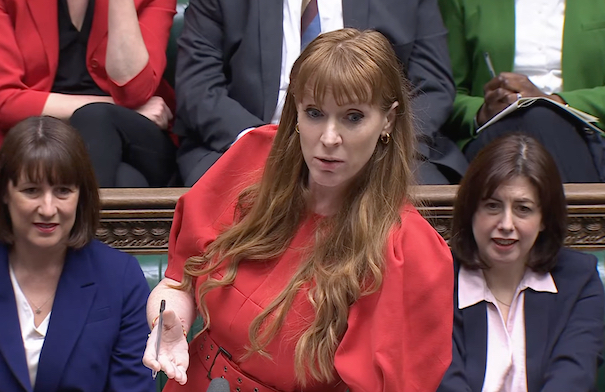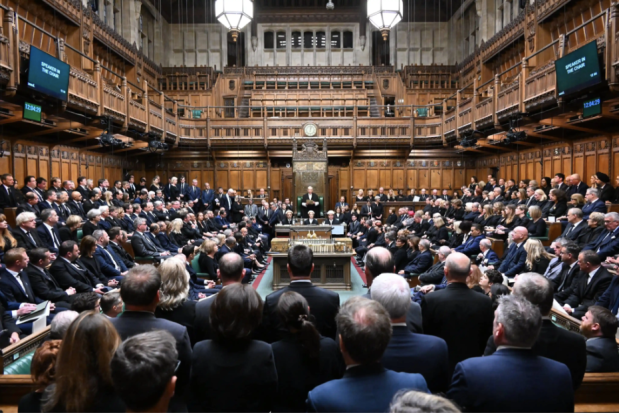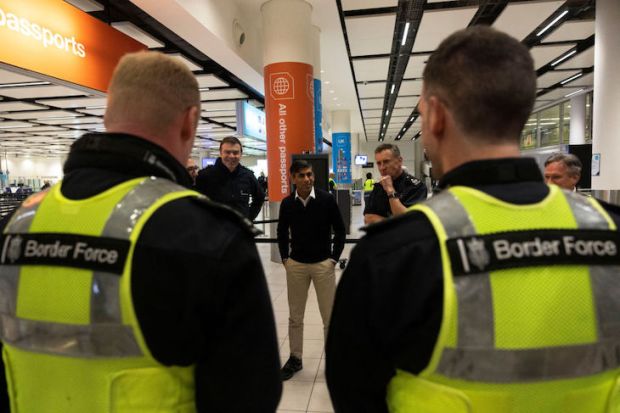Why won’t the government proscribe the Iranian Revolutionary Guard Corps? MPs have been asking that question for more than a year now, but it has gained impetus since the Hamas attack on Israel, given the suspicion that Iran has been aiding Hamas. So far, the line from the Prime Minister and Foreign Secretary has merely been that the government never comments on sanctions or which organisations are being considered for proscription.
But today at Foreign Office questions in the Commons, James Cleverly offered a little more insight, presumably because the parliamentary pressure is growing. A number of MPs asked why nothing had yet been done, including Liberal Democrat Layla Moran, who has spoken movingly about her family in Gaza. She asked ‘why have we yet to proscribe the IRGC [the Iranian Revolutionary Guard Corps]? Surely it was time back a year ago, but surely now, what’s the excuse for waiting?’
Cleverly replied: ‘We are well aware of Iran’s influence. As I regularly said, any decision about proscription will be a cross-government decision. The advantages and disadvantages of doing that will always be held at the heart of any decision-making process.’
Labour’s Wayne David pressed him further, claiming the United States has called on the UK to follow its example on the IRGC. Cleverly responded:
I would remind the House that the IRGC is sanctioned in its entirety, as well as certain other individuals who are members of the IRGC. As I’ve said in response to the honourable lady’s question, no international measure comes without costs. There are, of course, advantages and disadvantages to proscription which would fundamentally mean that we could have no direct diplomatic relations with Iran. As I said, we always take these issues very serious, any decision that we make will be made across government, but we do not speculate on future sanctions or proscription designations.
It isn’t just on the IRGC where proscription pressure is growing. It’s also Hizb ut-Tahrir, which is still able to hold protests where the chants of ‘jihad’ were heard at the weekend. At the weekend, I spoke to Lord Mann, the government’s independent adviser on anti-Semitism, who said that this group should be proscribed: it is already banned in Germany and a number of other western countries. It would be a more straightforward decision for ministers, for one thing, unlike the IRGC decision, which would lead to a severing of diplomatic relations. Those relations remain useful for the US, despite its own proscription of the IRGC.
The session in the Commons today was largely dominated by questions about aid to Gaza and whether or not Israel would be properly held to account for any breaches of international law. Cleverly and the development minister Andrew Mitchell both made clear that getting aid to Gaza was a priority, saying that not enough supplies had made it in. But they also maintained the rejection of calls for a ceasefire, arguing that Israel had to defend itself.
Labour’s shadow foreign secretary David Lammy used his two questions to ask for an update on securing the release of the Israeli hostages and then for assurances that Israel must follow international law. Cleverly thanked him for the ‘calm professionalism that he has displayed’ and also told him that ‘the preservation of civilian life remains a priority’. He added:
We discuss this regularly and at every level within the Israeli government. And of course, we reflect on the point that Israel itself as well as the countries in the near neighbourhood are trying to prevent this becoming a regional conflict, and as I say professionalism and restraint by the Israeli Defence Force is an important part of preventing this becoming a regional conflict.
The tone of this debate was a little more divided than previous ones, largely because of the difference of opinion on whether a ceasefire is an appropriate thing to ask for. But the consensus between the two main parties remains for now.
Got something to add? Join the discussion and comment below.
Get 10 issues for just $10
Subscribe to The Spectator Australia today for the next 10 magazine issues, plus full online access, for just $10.





















Comments
Don't miss out
Join the conversation with other Spectator Australia readers. Subscribe to leave a comment.
SUBSCRIBEAlready a subscriber? Log in